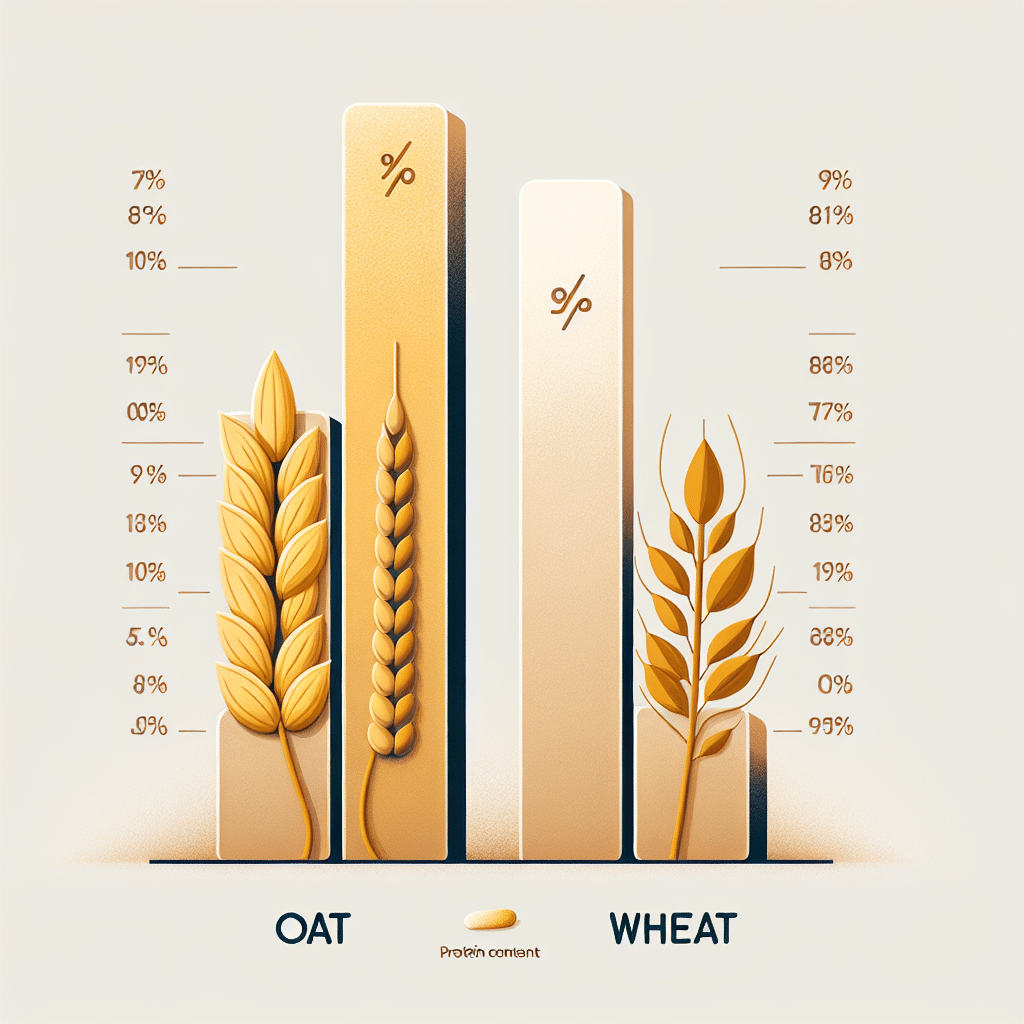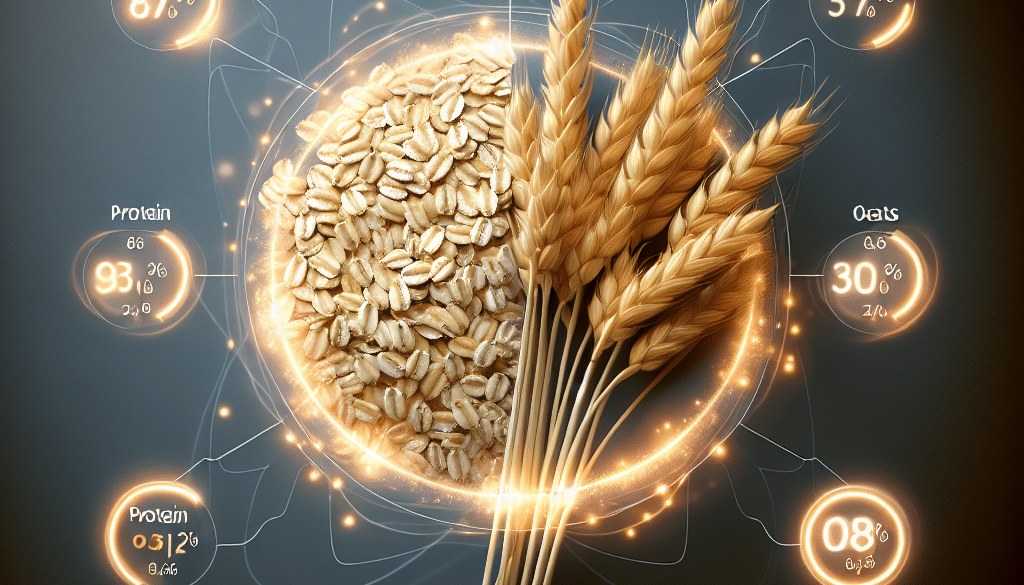Do Oats Have More Protein Than Wheat?
-
Table of Contents
- Oats vs. Wheat: A Protein Comparison
- Understanding Protein in Grains
- Protein Content: Oats vs. Wheat
- Nutritional Profile Beyond Protein
- Health Benefits of Oats and Wheat
- Protein Quality and Digestibility
- Practical Considerations in Diet
- Conclusion: The Protein Verdict
- Discover ETprotein’s High-Quality Protein Products
Oats vs. Wheat: A Protein Comparison

When it comes to choosing healthy grains, oats and wheat are two of the most popular options on the market. They are both integral components of a balanced diet, offering a wealth of nutritional benefits. However, one question that often arises is whether oats have more protein than wheat. This article delves into the protein content of these grains, comparing their nutritional profiles and discussing their health implications.
Understanding Protein in Grains
Proteins are essential macronutrients required for building and repairing tissues, making enzymes and hormones, and supporting overall health. Grains, while often recognized for their carbohydrate content, can also be significant sources of protein.
Protein Content: Oats vs. Wheat
When comparing the protein content of oats and wheat, it’s important to consider the different forms these grains can take. For instance, whole grain wheat and whole grain oats may have different protein concentrations than their processed counterparts like wheat flour or oatmeal.
- Whole Grain Oats: On average, whole grain oats contain approximately 13-15 grams of protein per 100 grams.
- Whole Grain Wheat: Whole grain wheat typically has around 12-14 grams of protein per 100 grams.
These values suggest that oats and wheat are quite comparable in terms of protein content, with oats having a slight edge. However, the difference is minimal and may not be significant in the context of an overall diet.
Nutritional Profile Beyond Protein
While protein content is an important factor, it’s also essential to consider the broader nutritional profile of these grains:
- Fiber: Both oats and wheat are high in dietary fiber, which is beneficial for digestive health. Oats, in particular, contain beta-glucan, a type of soluble fiber known for its heart health benefits.
- Vitamins and Minerals: Oats and wheat provide a range of vitamins and minerals, including B vitamins, iron, magnesium, and zinc. The exact levels can vary depending on the specific type of grain and processing methods.
- Antioxidants: Whole grains are a good source of antioxidants, which help combat oxidative stress in the body. Oats contain avenanthramides, unique antioxidants not found in wheat.
Considering these factors, both oats and wheat have their unique advantages and can be part of a nutritious diet.
Health Benefits of Oats and Wheat
Both oats and wheat offer numerous health benefits:
- Oats are renowned for their ability to lower cholesterol levels and improve heart health due to the presence of beta-glucan.
- Wheat, especially in its whole grain form, can help with weight management and reduce the risk of chronic diseases like type 2 diabetes and heart disease.
It’s important to choose whole grain versions of these grains to maximize their health benefits.
Protein Quality and Digestibility
When assessing the protein quality of oats and wheat, it’s crucial to consider their amino acid profiles. Proteins are made up of amino acids, some of which are essential and must be obtained through diet.
- Oats have a relatively good balance of essential amino acids, but like most plant proteins, they are not considered complete proteins as they have lower levels of some essential amino acids, such as lysine.
- Wheat also lacks a sufficient amount of certain essential amino acids, making it an incomplete protein source.
Combining these grains with other protein sources can help ensure a complete amino acid profile in your diet.
Practical Considerations in Diet
When incorporating oats and wheat into your diet, consider the following:
- Variety: Eating a variety of grains will provide a wider range of nutrients and reduce the risk of nutrient deficiencies.
- Preparation: How you prepare oats and wheat can affect their nutritional value. Opt for cooking methods that preserve their nutrient content.
- Dietary Restrictions: If you have celiac disease or gluten sensitivity, oats are generally a safer choice, although it’s important to choose oats that are certified gluten-free to avoid cross-contamination with wheat.
Conclusion: The Protein Verdict
In conclusion, oats and wheat have similar protein contents, with oats having a slight advantage. However, the difference is minimal and should not be the sole factor in choosing between these grains. Both oats and wheat offer valuable nutrients and health benefits, making them excellent additions to a balanced diet. When considering protein intake, it’s important to look at the overall diet and include a variety of protein sources to ensure a complete amino acid profile.
Discover ETprotein’s High-Quality Protein Products
If you’re looking to supplement your diet with additional protein, ETprotein offers a range of organic bulk vegan proteins that can complement your intake from grains like oats and wheat. Their products are non-GMO, allergen-free, and come with a neutral taste, making them an excellent choice for various dietary needs.
ETprotein’s offerings include Organic rice protein, pea protein, and a variety of seed proteins, all characterized by high purity and quality. Whether you’re involved in sports nutrition, weight management, or general health and wellness, ETprotein has a protein solution for you.
For more information or to sample their products, please contact ETprotein and email sales(at)ETprotein.com today.
About ETprotein:
ETprotein, a reputable protein and L-(+)-Ergothioneine (EGT) Chinese factory manufacturer and supplier, is renowned for producing, stocking, exporting, and delivering the highest quality organic bulk vegan proteins and L-(+)-Ergothioneine. They include Organic rice protein, clear rice protein, pea protein, clear pea protein, watermelon seed protein, pumpkin seed protein, sunflower seed protein, mung bean protein, peanut protein, and L-(+)-Ergothioneine EGT Pharmaceutical grade, L-(+)-Ergothioneine EGT food grade, L-(+)-Ergothioneine EGT cosmetic grade, L-(+)-Ergothioneine EGT reference grade and L-(+)-Ergothioneine EGT standard. Their offerings, characterized by a neutral taste, non-GMO, allergen-free attributes, with L-(+)-Ergothioneine purity over 98%, 99%, cater to a diverse range of industries. They serve nutraceutical, pharmaceutical, cosmeceutical, veterinary, as well as food and beverage finished product distributors, traders, and manufacturers across Europe, USA, Canada, Australia, Thailand, Japan, Korea, Brazil, and Chile, among others.
ETprotein specialization includes exporting and delivering tailor-made protein powder and finished nutritional supplements. Their extensive product range covers sectors like Food and Beverage, Sports Nutrition, Weight Management, Dietary Supplements, Health and Wellness Products, and Infant Formula, ensuring comprehensive solutions to meet all your protein needs.
As a trusted company by leading global food and beverage brands and Fortune 500 companies, ETprotein reinforces China’s reputation in the global arena. For more information or to sample their products, please contact them and email sales(at)ETprotein.com today.












